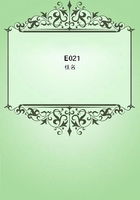
第105章
Great men are not commonly in its halls: they are absent in the field: they are working, not triumphing. Fashion is made up of their children; of those, who, through the value and virtue of somebody, have acquired lustre to their name, marks of distinction, means of cultivation and generosity, and, in their physical organization, a certain health and excellence, which secures to them, if not the highest power to work, yet high power to enjoy. The class of power, the working heroes, the Cortez, the Nelson, the Napoleon, see that this is the festivity and permanent celebration of such as they; that fashion is funded talent; is Mexico, Marengo, and Trafalgar beaten out thin; that the brilliant names of fashion run back to just such busy names as their own, fifty or sixty years ago. They are the sowers, their sons shall be the reapers, and _their_ sons, in the ordinary course of things, must yield the possession of the harvest to new competitors with keener eyes and stronger frames. The city is recruited from the country. In the year 1805, it is said, every legitimate monarch in Europe was imbecile. The city would have died out, rotted, and exploded, long ago, but that it was reinforced from the fields. It is only country which came to town day before yesterday, that is city and court today.
Aristocracy and fashion are certain inevitable results. These mutual selections are indestructible. If they provoke anger in the least favored class, and the excluded majority revenge themselves on the excluding minority, by the strong hand, and kill them, at once a new class finds itself at the top, as certainly as cream rises in a bowl of milk: and if the people should destroy class after class, until two men only were left, one of these would be the leader, and would be involuntarily served and copied by the other. You may keep this minority out of sight and out of mind, but it is tenacious of life, and is one of the estates of the realm. I am the more struck with this tenacity, when I see its work. It respects the administration of such unimportant matters, that we should not look for any durability in its rule. We sometimes meet men under some strong moral influence, as, a patriotic, a literary, a religious movement, and feel that the moral sentiment rules man and nature. We think all other distinctions and ties will be slight and fugitive, this of caste or fashion, for example; yet come from year to year, and see how permanent that is, in this Boston or New York life of man, where, too, it has not the least countenance from the law of the land. Not in Egypt or in India a firmer or more impassable line.
Here are associations whose ties go over, and under, and through it, a meeting of merchants, a military corps, a college-class, a fire-club, a professional association, a political, a religious convention; -- the persons seem to draw inseparably near; yet, that assembly once dispersed, its members will not in the year meet again.
Each returns to his degree in the scale of good society, porcelain remains porcelain, and earthen earthen. The objects of fashion may be frivolous, or fashion may be objectless, but the nature of this union and selection can be neither frivolous nor accidental. Each man's rank in that perfect graduation depends on some symmetry in his structure, or some agreement in his structure to the symmetry of society. Its doors unbar instantaneously to a natural claim of their own kind. A natural gentleman finds his way in, and will keep the oldest patrician out, who has lost his intrinsic rank. Fashion understands itself; good-breeding and personal superiority of whatever country readily fraternize with those of every other. The chiefs of savage tribes have distinguished themselves in London and Paris, by the purity of their tournure.